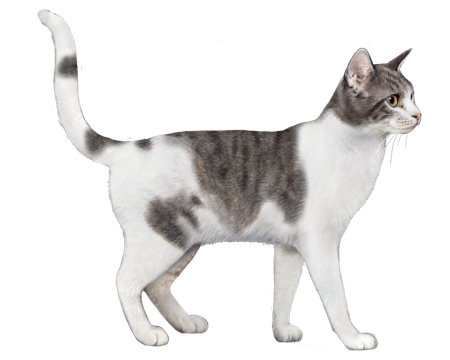
Omani Street Cat
Omani street cats are feral cats that have adapted to an independent, outdoor life in hot, Middle Eastern environments.
Interested in discovering if your cat is an Omani Street Cat?
Check out Wisdom Panel's DNA test.
Omani Street Cat Traits
General Appearance
Omani street cats come in all shapes and sizes. Cats resembling Arabian Maus are medium-sized and agile, with large, pointed ears.
Signs of a life-long street cat include a well-kept coat (thanks to their meticulous grooming habits), protective body language, and lack of eye contact. Because they are intact, male street cats may have thick necks, muscular bodies, and scars from fighting.
Coat and Coloring
Omani street cats' coats can come in all colors and patterns. They typically have short hair with no undercoat, which helps them avoid overheating in grueling summer weather.
Distinctive Physical Traits
Omani street cats do not follow a breed standard. So, any combination of features is possible.
Omani Street Cat Temperament
Street cats often live in groups and congregate near food sources and shelter. Many cats are fearful of being handled or confined by humans. But some may adapt to interactions with people and learn to live indoors.
Omani Street Cat History
Omani street cats likely evolved from landrace desert cats native to the Arabian Peninsula. Many of the feral cats roaming the streets in Oman are Arabian Maus—an ancient breed that only recently received recognition from the World Cat Federation.
In cities such as Muscat, Omani street cat populations are quite large. Because there is little support for these cats, animal advocates utilize trap, neuter, and release (TNR) programs to help keep homeless populations in check.
Omani Street Cat Care
Nutrition
An Omani street cat's diet typically consists of whatever they can find—scraps from trash cans, birds and rodents, handouts from kind strangers, and so on. If you're leaving food out for a street cat, they will benefit from the same commercially prepared diets as pet cats.
Grooming
Street cats are typically effective self-groomers that keep their coats relatively clean. If you've taken in a street cat that will tolerate it, regular brushing and nail trims will help keep them in tip-top shape.
Health
Omani street cats are susceptible to the same diseases as pet cats—including rabies, distemper, feline immunodeficiency virus, and feline leukemia. They are also at risk for numerous internal and external parasites and health issues associated with poor nutrition.
Breed Group
Free-roaming
While sharing similar characteristics with domestic pet cats, Free-Roaming cats are a genetically diverse group which are adapted to spending an independent life outdoors with little to no reliance on humans for their needs.
Resources
https://en.wikipedia.org/wiki/Arabian_Mau
https://www.petguide.com/breeds/cat/arabian-mau/
https://www.heart.co.uk/lifestyle/international-cat-day-2018-street-cats-in-oman/
https://www.alleycat.org/resources/feral-and-stray-cats-an-important-difference/
https://icatcare.org/unowned-cats/the-different-needs-of-domestic-cats/
https://www.knowyourcat.info/lib/feralcats.htm
https://www.humanesociety.org/sites/default/files/docs/caring-community-cats-overview.pdf
Reviewed February 23, 2021 by Annette Louviere, DVM


















